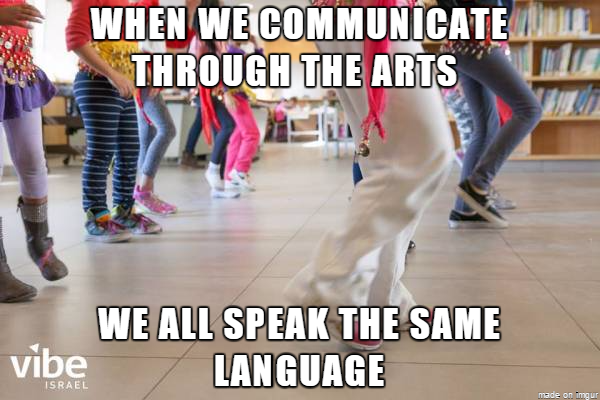10 Practices to Help Bilingual Students Succeed from a Tel Aviv School via #VibeEdu @VibeIsrael Tour

This is just one in a series of ongoing posts on the educational innovations in Israel. You can see additional coverage here.
New York City is indeed a melting pot, and while New Yorkers embrace its diversity, teaching in a school where students are not fluent in English, and often are not even literate in their own language, is challenging. Students are often unable to perform at grade level, not because of their capacity to learn, but because of their capacity to understand the language. What’s more, after just one year in the country, foreign-born students are expected to perform on the same standardized tests as native speakers. When they don’t, there’s a domino effect: the student is labeled a failure. His parent feels like a failure. His teacher a failure, and if there are many such students in attendance, the school is labeled a failure. The failure however is not the student, teacher, or school. The failure is the a school system that is failing these students.
Does any of this sound familiar?
What if there was a way to change this scenario?
As one of five bloggers invited to be a part of #VibeIsrael’s #VibeEdu Education Innovation tour I had the chance to visit a school where none of this is the case. The Bialik Rogozin School provides a unique model where refugees and children of migrant workers, some of them with little or no schooling at all, are integrated into Israeli society with common sense educational strategies that any school or district could adopt.

Students at Bialik Rogozin Scohol connect through the common language of the arts.
Here they dance to music from various cultures.
Tools and ideas to transform education. Sign up below.
Here they are:
- Daily lessons in the language of your country (and maybe another?)
You can’t truly integrate into a culture if you are unable to speak the language. It seems many schools in America have ignored this. Not so in Israel. Students at the Bialik Rogozin school learn Hebrew and English every single day. These lessons continue not for a random amount of time, but until the student has reached fluency in the language. - Daily lessons in their native language
Many students have no literacy in their native language (UCLA professor Olga Kegan explains the problem in this story about immigration in the LA Times). Developing and maintaining literacy in their native language is crucial for the child for a number of reasons. These reasons are both for the benefit of the student (the ability to connect with parents and families and the reality that some children may end up back in the country from which they came) and the benefit of the country (a multilingual population will help countries to compete in a global economy). - Embrace student heritage
While there is a focus on assimilation into the culture, there is also an intentional effort to respect and honor the heritage of each student. This means recognizing, supporting, and sharing cultural practices. - Art is the universal language
At Bialik Rogozin all students and teachers were able to express themselves through the arts. They learn dance that celebrates each of the children’s culture. They sing in English, Hebrew, and the various languages represented in their school. They create art that helps themselves and one another understand not only subjects, but the cultural diversity of the school. - Standardized tests when language is acquired
Students do not take standardized tests until their final year of school. This is a good thing as it generally takes three years for language acquisition and it wouldn’t be reasonable to test students before they achieve language fluency. - Staff diversity
While not quite as diverse as their students, the school’s teachers come from various backgrounds. They are Jews, Muslims and Christians, religious and secular men and women – conveying the message that you can be comfortable with your own culture while respecting the State of Israel. - Group hugs
These students often come from very difficult backgrounds. In many cases they are traumatized. The group hug was omnipresent in this school to show joy when a favorite teacher or volunteer came by or to celebrate student work at the end of a lesson. Group hugs are a sure ticket to joy and smiles. - Include and listen to parents
In many schools that lack of parent involvement is accepted as a given. Karen Tal who served as principal of Bialik Rogozin shared her simple strategy to change that. She sent home one question to her parents, each in the language that parent spoke. The question was this: How can our school help you? Their answer: Teach us Hebrew and English. She opened her doors and the parents came flooding in. The school is open every night from 6 - 10 to support parents and their children. - Social workers for parents
Schools understand the need for students, especially ones coming from difficult backgrounds, to have the support of social workers. As principal, what Tal recognized was that the parents also needed support. As a young immigrant Tal was fortunate that her parents saw the value of education, hard work, and helping others. She noticed some of her friends did not have the same good fortune in their upbringing. The parents in many cases were just so traumatized themselves, they gave up and their children often left school. This experience helped her understand the importance of needing to provide parents support if they want children to be successful. Social workers help parents understand concepts and strategies like how to discipline a child without beating them. A practice accepted in many cultures, but not in the one in which they are trying to assimilate. - Recruit donor volunteers who can shine
Bialik Rogozin dedicates a lot of time recruiting donors who open up more than just their wallets. They open up their hearts and share their minds to touch the heart and minds of their students. This school has created a story of promise and hope that many Israeli immigrants can relate to in someway. They can immediately see how their time and money can completely change a family. These volunteer donors are now a part of an important story and school family that has a deep respect and appreciation for their help. Places like New York City are home to some of the wealthiest citizens in the nation. What was their key to recruiting some of the elite of Israeli society to support their school? They formed a parent association and invited these donor volunteers to take part. They come together regularly as a parent association to be a part of something bigger than themselves that will change not only the lives of these students, but the fabric of their community.
The Bialik Rogozin School received international acclaim when an HBO film about its special program, Strangers No More, won the 2011 Academy Award for Best Short Documentary. Take a look at the video below to get a glimpse of what happens when these practices are put in place.
Bialik Rogozin has innovative, yet common sense, strategies that are transforming a nation. They employed strategies that can be incorporated by any school or district. Perhaps not all at once, but even starting with one or two could make the difference for a child, family, and community. Are there strategies here that you would consider trying where you work? If so, please share in the comments.
Interested in learning more about Vibe Israel’s #VibeEdu Tour? Check out the tour site here or follow their work at:
Blog
Photo credit: Amit Shemesh - www.amitshemesh.com
Lisa Nielsen writes for and speaks to audiences across the globe about learning innovatively and is frequently covered by local and national media for her views on “Passion (not data) Driven Learning,” "Thinking Outside the Ban" to harness the power of technology for learning, and using the power of social media to provide a voice to educators and students. Ms. Nielsen has worked for more than a decade in various capacities to support learning in real and innovative ways that will prepare students for success. In addition to her award-winning blog, The Innovative Educator, Ms. Nielsen’s writing is featured in places such as Huffington Post, Tech & Learning, ISTE Connects, ASCD Wholechild, MindShift, Leading & Learning, The Unplugged Mom, and is the author the book Teaching Generation Text.
Disclaimer: The information shared here is strictly that of the author and does not reflect the opinions or endorsement of her employer.
Lisa Nielsen (@InnovativeEdu) has worked as a public-school educator and administrator since 1997. She is a prolific writer best known for her award-winning blog, The Innovative Educator. Nielsen is the author of several books and her writing has been featured in media outlets such as The New York Times, The Wall Street Journal, and Tech & Learning.
Disclaimer: The information shared here is strictly that of the author and does not reflect the opinions or endorsement of her employer.
